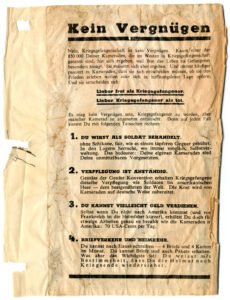This is one side of a two-sided leaflet, entitled “No Joke,” intended to persuade German soldiers to surrender. It was produced by the Psychological Warfare Division of the Supreme Headquarters of the Allied Expeditionary Force (PWD/SHAEF), first printed January 5, 1945 and dropped on German troops, January 11-January 24, 1945. ZG 100.
PWD/SHAEF was established in 1943 and united both British and American government agencies to expand propaganda leaflet operations. This agency was responsible for some of the largest leaflet operations during the war, dropping hundreds of millions of leaflets on German soldiers. During the war leaflets like this were often used to disseminate propaganda to German soldiers to try to convince them to surrender or to lower their morale. These leaflets often tried to use reliable information with the sources of the information clearly labeled. This was done in the hopes of convincing German soldiers to trust the information in the leaflets, so that they would have a more significant impact.
For other leaflets produced by PWD/SHAEF and attached to the Goetz diary, see inserts from Sunday, February 4, 1945 and Friday, February 9, 1945.
Leaflet translation:
“NO JOKE”
No, captivity is no pleasure. Hardly any of your 850,000 comrades who have been captured in the West surrendered because the life of a captive appealed to him. They had to surrender, however. And more and more often, comrades, they must decide whether they want to experience peace or sacrifice themselves in a hopeless situation. They decide:
Better free than a prisoner of war.
Better a prisoner of war than dead.
It may not be pleasurable to be a prisoner of war, but many are pleasantly disappointed. In any case, you can expect the following:
1. You will be treated as a soldier,
without harassment, fairly, as is due to a courageous opponent. In the camp, self-government rules wherever possible. This means: Your own comrades are your immediate superiors.
2. Provisions are decent.
According to the Geneva Convention, prisoners of war receive the same provisions as soldiers in the American army – the best fed in the world. The food is prepared by comrades in the German way.
3. You can perhaps earn money.
Even if you don’t go to America (and the trip home from France is shorter), you receive the same payment for possible work as your comrades in America: 70 USA-cents per day.
4. Correspondence and homecoming.
You can write home – 4 letters and 4 cards in a month. You can also receive letters and parcels. What is most important, however: You know with certainty that you will see your home again after the war ends.”
